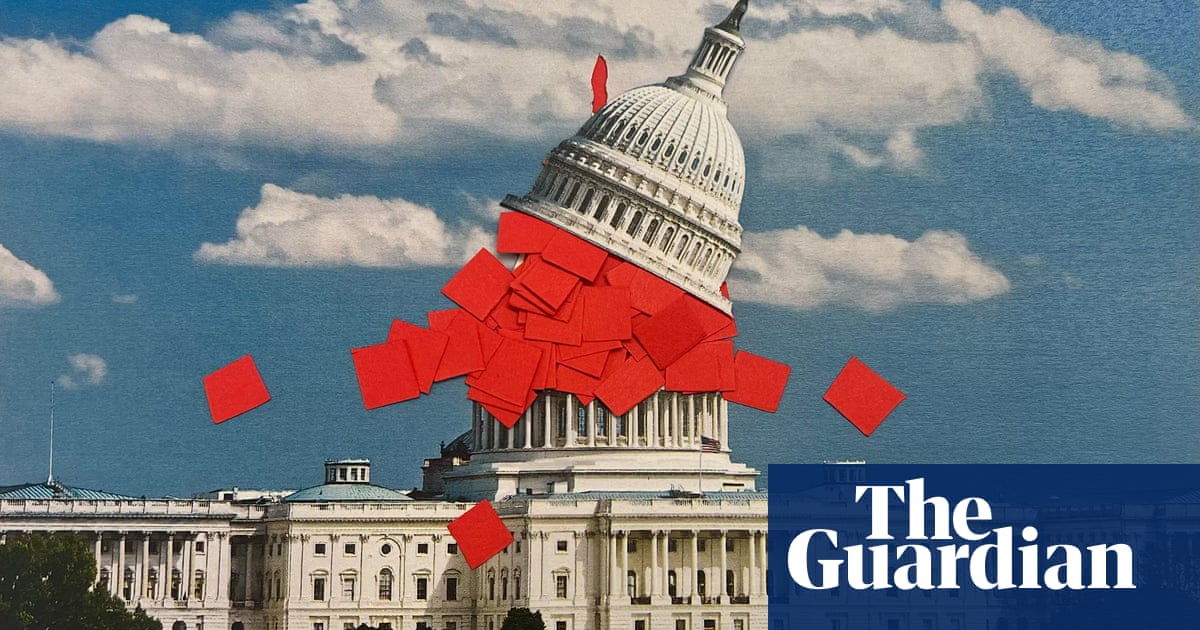
| News | |||||||||||||||||||||||||||||||||||||||||||||||||||||||||||||||||||||||||||||||||||||||||||||||||||||||||||||||||||||||||||||||||||||||||||||||||||||||||||||||
 Traps have been set up and thermal imaging cameras are being used in an effort to locate the fugitive monkeys, police said. Traps have been set up and thermal imaging cameras are being used in an effort to locate the fugitive monkeys, police said. | |
Submitted at 11-07-2024, 04:42 PM by sleeppoor | |
7 Comments | |
 The problem isn’t that cities like Reading are now Trump strongholds, but that Harris’s campaign gave few reasons for enthusiasm. The problem isn’t that cities like Reading are now Trump strongholds, but that Harris’s campaign gave few reasons for enthusiasm. | |
Submitted at 11-07-2024, 02:33 AM by sleeppoor | |
 Some claim that Ozempic or similar drugs destroyed their gut health.
In 2021, Jacqueline Barber agreed to try Ozempic because her doctor swore it would “work wonders” for her diabetes. A few months later, the vomiting started.
Barber, who is 49 and lives in Kentucky, threw up constantly, so much that she started sleeping on the couch with a garbage can beside her every night. But the drug was keeping her blood sugar under control and her endocrinologist didn’t think it could be the cause of such persistent vomiting, so she stayed on it—even as she began “wasting away,” her muscles deteriorating so much that she needed a walker and her front teeth crumbling from exposure to stomach acid. Some claim that Ozempic or similar drugs destroyed their gut health.
In 2021, Jacqueline Barber agreed to try Ozempic because her doctor swore it would “work wonders” for her diabetes. A few months later, the vomiting started.
Barber, who is 49 and lives in Kentucky, threw up constantly, so much that she started sleeping on the couch with a garbage can beside her every night. But the drug was keeping her blood sugar under control and her endocrinologist didn’t think it could be the cause of such persistent vomiting, so she stayed on it—even as she began “wasting away,” her muscles deteriorating so much that she needed a walker and her front teeth crumbling from exposure to stomach acid. | |
Submitted at 11-06-2024, 03:17 PM by NickNoheart | |
 Republicans win key seats and take back upper chamber in result that had been widely anticipated Republicans win key seats and take back upper chamber in result that had been widely anticipated | |
Submitted at 11-06-2024, 07:11 AM by sleeppoor | |
 Company announces death of billionaire who contributed millions to Republican party and former president Company announces death of billionaire who contributed millions to Republican party and former president | |
Submitted at 11-05-2024, 08:02 PM by sleeppoor | |
 A bug that WIRED discovered in True the Vote’s VoteAlert app revealed user information—and an election worker who wrote about carrying out an illegal voter-suppression scheme. A bug that WIRED discovered in True the Vote’s VoteAlert app revealed user information—and an election worker who wrote about carrying out an illegal voter-suppression scheme. | |
Submitted at 11-05-2024, 07:04 PM by sleeppoor | |
 (or AI for The Labor Question & What is Silicon Valley?) (or AI for The Labor Question & What is Silicon Valley?)
| |
Submitted at 11-04-2024, 07:01 PM by sleeppoor | |
 NEW YORK - A man who took in an orphaned squirrel and made it a social media star vowed Saturday that New York state's decision to seize and euthanize the animal "won't go unheard."
"We will make a stance on how this government and New York state utilizes their resources," Mark Longo said in a phone interview.
He declined to specify his possible next steps but said officials would hear from him soon about what happened to Peanut the squirrel and Fred, a rescued raccoon that was also confiscated and put down. NEW YORK - A man who took in an orphaned squirrel and made it a social media star vowed Saturday that New York state's decision to seize and euthanize the animal "won't go unheard."
"We will make a stance on how this government and New York state utilizes their resources," Mark Longo said in a phone interview.
He declined to specify his possible next steps but said officials would hear from him soon about what happened to Peanut the squirrel and Fred, a rescued raccoon that was also confiscated and put down. | |
Submitted at 11-04-2024, 03:42 PM by NickNoheart | |
 It’s an extraordinary look inside a key American institution under intense external scrutiny and internal pressure. It’s an extraordinary look inside a key American institution under intense external scrutiny and internal pressure. | |
Submitted at 11-04-2024, 12:03 PM by Mordant | |
 Of course, they are the ones planning it Of course, they are the ones planning it | |
Submitted at 11-03-2024, 06:08 PM by Nibbles | |
 Jeffrey Epstein described himself as Donald Trump’s “closest friend” and claimed intimate knowledge of his proclivity for sex, including cuckolding his best friends, according to recordings obtained exclusively by the Daily Beast.
The convicted pedophile even boasted of his closeness to Trump and his now-wife Melania by claiming, “the first time he slept with her was on my plane,” which was dubbed the Lolita Express.
Epstein spoke at length about Trump with the author Michael Wolff in August 2017, two years before being found dead in his jail cell. Wolff was researching his bombshell bestseller Fire and Fury at the time.
The recordings cast more light on Trump’s long relationship with Epstein, and will add to debate over the character of the Republican candidate, especially his attitudes and conduct toward women, just days before the election. Jeffrey Epstein described himself as Donald Trump’s “closest friend” and claimed intimate knowledge of his proclivity for sex, including cuckolding his best friends, according to recordings obtained exclusively by the Daily Beast.
The convicted pedophile even boasted of his closeness to Trump and his now-wife Melania by claiming, “the first time he slept with her was on my plane,” which was dubbed the Lolita Express.
Epstein spoke at length about Trump with the author Michael Wolff in August 2017, two years before being found dead in his jail cell. Wolff was researching his bombshell bestseller Fire and Fury at the time.
The recordings cast more light on Trump’s long relationship with Epstein, and will add to debate over the character of the Republican candidate, especially his attitudes and conduct toward women, just days before the election. | |
Submitted at 11-03-2024, 08:30 PM by Wreckard | |
 PBS NewsHour reported on Lakeland' s Taylor Cadle, who was charged with filing a false report at age 12 after accusing her adoptive father of rape.
The NewsHour segment emphasized that Taylor felt it necessary to gather evidence on her own to prove that her adoptive father had raped her. She took those brave actions knowing that about a year earlier, the Polk County Sheriff’s Office not only declined to arrest Henry Cadle but charged Taylor with filing a false report.
At the suggestion of her adoptive mother — Henry Cadle’s wife — Taylor pled guilty. As part of her probation, she was required to write letters of apology to Henry Cadle and to Polk County Sheriff’s Deputy Melissa Turnage, the officer who interviewed her after the original complaint. PBS NewsHour reported on Lakeland' s Taylor Cadle, who was charged with filing a false report at age 12 after accusing her adoptive father of rape.
The NewsHour segment emphasized that Taylor felt it necessary to gather evidence on her own to prove that her adoptive father had raped her. She took those brave actions knowing that about a year earlier, the Polk County Sheriff’s Office not only declined to arrest Henry Cadle but charged Taylor with filing a false report.
At the suggestion of her adoptive mother — Henry Cadle’s wife — Taylor pled guilty. As part of her probation, she was required to write letters of apology to Henry Cadle and to Polk County Sheriff’s Deputy Melissa Turnage, the officer who interviewed her after the original complaint. | |
Submitted at 11-03-2024, 03:49 AM by sleeppoor | |
 The former president had a meltdown at a rally in Milwaukee Friday night over a faulty mic, which culminated in him simulating fellatio. The former president had a meltdown at a rally in Milwaukee Friday night over a faulty mic, which culminated in him simulating fellatio. | |
Submitted at 11-03-2024, 02:53 AM by Mordant | |
 "The fear of humans is ingrained and pervasive," said Clinchy. "There's this idea that the animals are going to habituate to humans if they're not hunted. But we've shown that this isn't the case." "The fear of humans is ingrained and pervasive," said Clinchy. "There's this idea that the animals are going to habituate to humans if they're not hunted. But we've shown that this isn't the case." | |
Submitted at 11-02-2024, 08:37 PM by Nibbles | |
 Pentagon removed this photo in embarrassment Pentagon removed this photo in embarrassment | |
Submitted at 11-02-2024, 07:51 PM by sleeppoor | |
 Derrick Anderson's campaign sent an angry letter in response to a hilarious ad depicting Anderson living with cardboard cutouts of someone else's family. Derrick Anderson's campaign sent an angry letter in response to a hilarious ad depicting Anderson living with cardboard cutouts of someone else's family. | |
Submitted at 11-02-2024, 05:38 PM by The Livin' Burden | |
 A group of anti-government extremists who showed up in western North Carolina promising to provide disaster relief after Hurricane Helene is now threatening to destroy cell-phone towers and sabotage military vehicles.
The group, Veterans on Patrol, attracted attention by setting up a disaster relief staging area in the parking lot of the Ingles grocery store in Lake Lure, about 50 miles from Asheville.
But locals, including some who initially cooperated with the group, began to complain about threats and harassment.
Over the past three weeks, members of the group, which falsely claims that Helene was caused by a “weather weapon,” have been making conspiracy-driven claims that the U.S. military is attempting to kill U.S. citizens with “directed energy weapons.” A group of anti-government extremists who showed up in western North Carolina promising to provide disaster relief after Hurricane Helene is now threatening to destroy cell-phone towers and sabotage military vehicles.
The group, Veterans on Patrol, attracted attention by setting up a disaster relief staging area in the parking lot of the Ingles grocery store in Lake Lure, about 50 miles from Asheville.
But locals, including some who initially cooperated with the group, began to complain about threats and harassment.
Over the past three weeks, members of the group, which falsely claims that Helene was caused by a “weather weapon,” have been making conspiracy-driven claims that the U.S. military is attempting to kill U.S. citizens with “directed energy weapons.” | |
Submitted at 11-02-2024, 01:36 AM by sleeppoor | |
 It took three ER visits and 20 hours before a hospital admitted Nevaeh Crain, 18, as her condition worsened. Doctors insisted on two ultrasounds to confirm “fetal demise.” She’s one of at least two Texas women who died under the state’s abortion ban. It took three ER visits and 20 hours before a hospital admitted Nevaeh Crain, 18, as her condition worsened. Doctors insisted on two ultrasounds to confirm “fetal demise.” She’s one of at least two Texas women who died under the state’s abortion ban. | |
Submitted at 11-01-2024, 03:30 PM by sleeppoor | |
 “Ghost jobs,” or ads for positions that aren’t actually open, are a common phenomenon in the tech industry, which has been plagued by layoffs and budget cuts over recent years. As unemployed workers struggle to regain their footing, recruiters and career coaches who spoke with SFGATE warned that these fake jobs posted by real companies serve multiple, sometimes insidious purposes.
According to a 2024 survey from MyPerfectResume, 81% of recruiters admitted to posting ads for positions that were fake or already filled. While some respondents said employers did it to maintain a presence on job boards and build a talent pool, it’s also used to commit psychological warfare: 25% said ghost jobs helped companies gauge how replaceable their employees were, while 23% said it helped make the company appear more stable during a hiring freeze. Another damning 2024 report from Resume Builder said that 62% companies posted them specifically to make their employees feel replaceable. They also made ads to “trick overworked employees” into believing that more people would be brought on to alleviate their overwhelming workload. “Ghost jobs,” or ads for positions that aren’t actually open, are a common phenomenon in the tech industry, which has been plagued by layoffs and budget cuts over recent years. As unemployed workers struggle to regain their footing, recruiters and career coaches who spoke with SFGATE warned that these fake jobs posted by real companies serve multiple, sometimes insidious purposes.
According to a 2024 survey from MyPerfectResume, 81% of recruiters admitted to posting ads for positions that were fake or already filled. While some respondents said employers did it to maintain a presence on job boards and build a talent pool, it’s also used to commit psychological warfare: 25% said ghost jobs helped companies gauge how replaceable their employees were, while 23% said it helped make the company appear more stable during a hiring freeze. Another damning 2024 report from Resume Builder said that 62% companies posted them specifically to make their employees feel replaceable. They also made ads to “trick overworked employees” into believing that more people would be brought on to alleviate their overwhelming workload. | |
Submitted at 11-01-2024, 03:35 PM by sleeppoor | |
 Police said a 17-year-old suspect was arrested Police said a 17-year-old suspect was arrested | |
Submitted at 11-01-2024, 03:49 PM by sleeppoor | |
